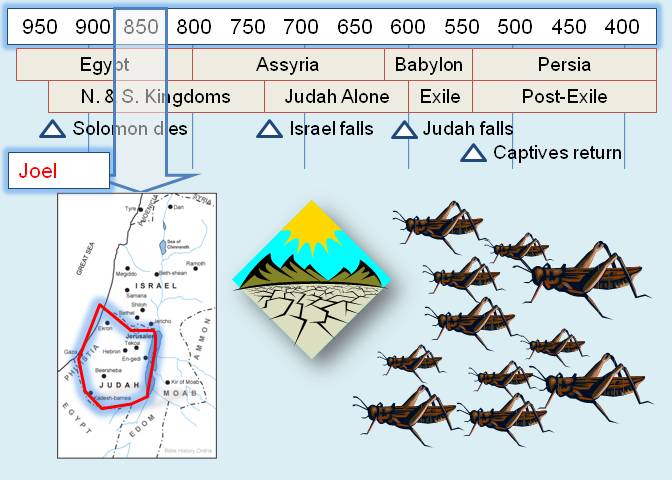A Survey of the Prophets - Joel
|
Historical Background of the Book. In Old Testament times, the economy of Canaan was based predominately on agriculture. As an agrarian economy, the Northern and Southern Israelite kingdoms could suffer hardship from any number of sources, including droughts, insect infestations, and livestock diseases. The date of the book of Joel is uncertain. Some scholars (as reflected in this survey) believe it may have been written as early as 830 B.C. During this time, the Southern Kingdom was experiencing both a prolonged drought and a plague of locusts. As a result, there was considerable suffering of both the people and their livestock.
The Author and the Audience. Joel was the son of Pethuel (Joel 1:1). The Bible reveals nothing else about him. His audience was the Southern Kingdom of Judah. He uses their present physical suffering as a warning of their unfaithfulness and calls them to repent with warnings of even more destruction to come. |
Outline/Major Themes. The major themes of the book can be highlighted using the overall outline of the book:
Messages for Christians. The book of Joel echoes several messages of value to Christians:
- Ch. 1:1-20 Current physical suffering and destruction
- Ch. 2:1-11 The coming "Day of the Lord" with even greater destruction
- Ch. 2:12-17 The call for repentance
- Ch. 2:18-32 The promise of deliverance with physical and spiritual blessings
- Ch. 3:1-17 The coming judgment on the Gentile nations around them
- Ch. 3:18-21 Promised blessings on Judah
Messages for Christians. The book of Joel echoes several messages of value to Christians:
- Physical hardships should remind us of God and encourage us to draw closer to Him (Matt. 6:25-34; Phil. 4:4-7).
- God always provides blessings for those who remain faithful to Him (1 Pet. 5:6-10; Rev. 2:10).
- The last and ultimate "Day of the Lord", the Judgment Day, still remains to occur and we should always be prepared for it (Matt. 24:42-44; 25:1-13).

